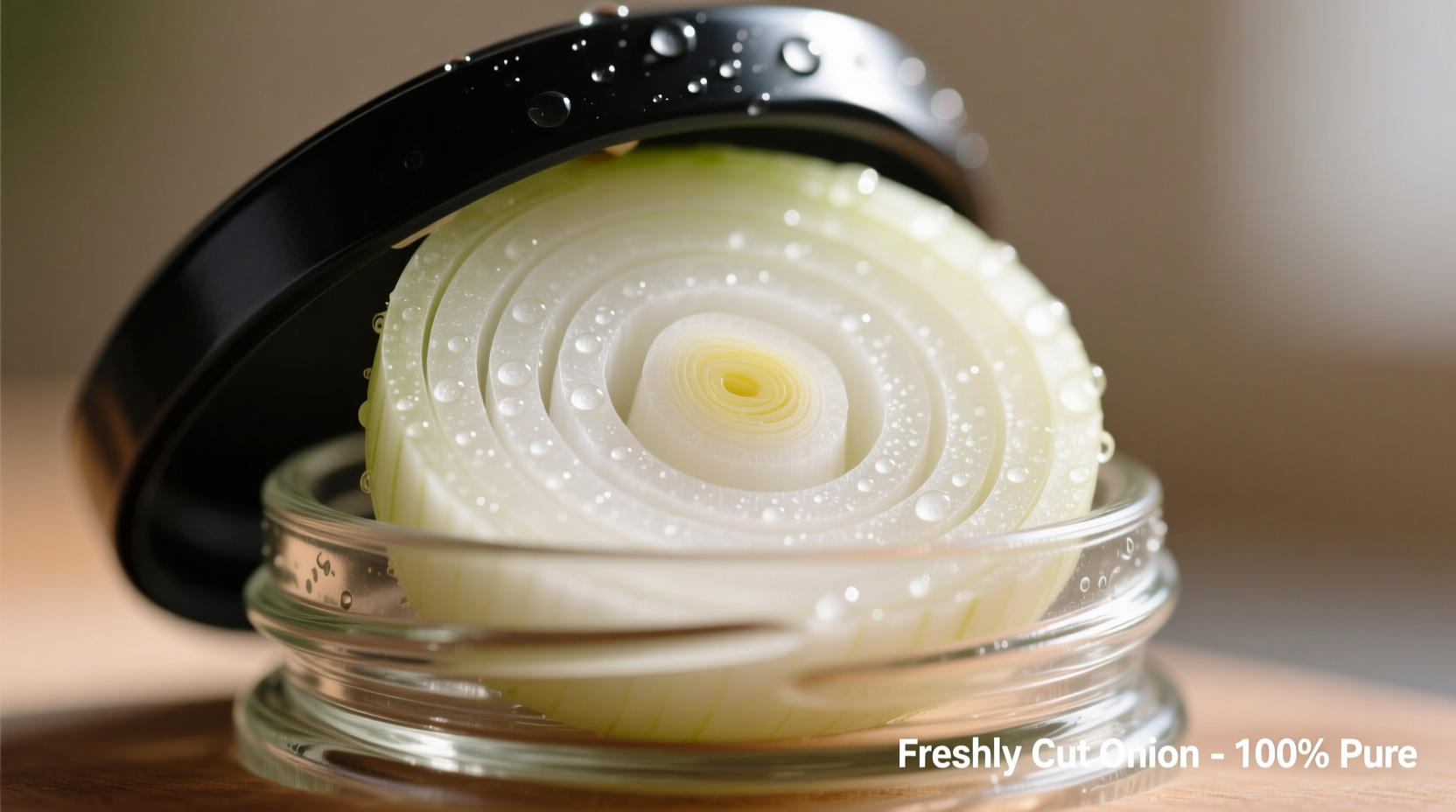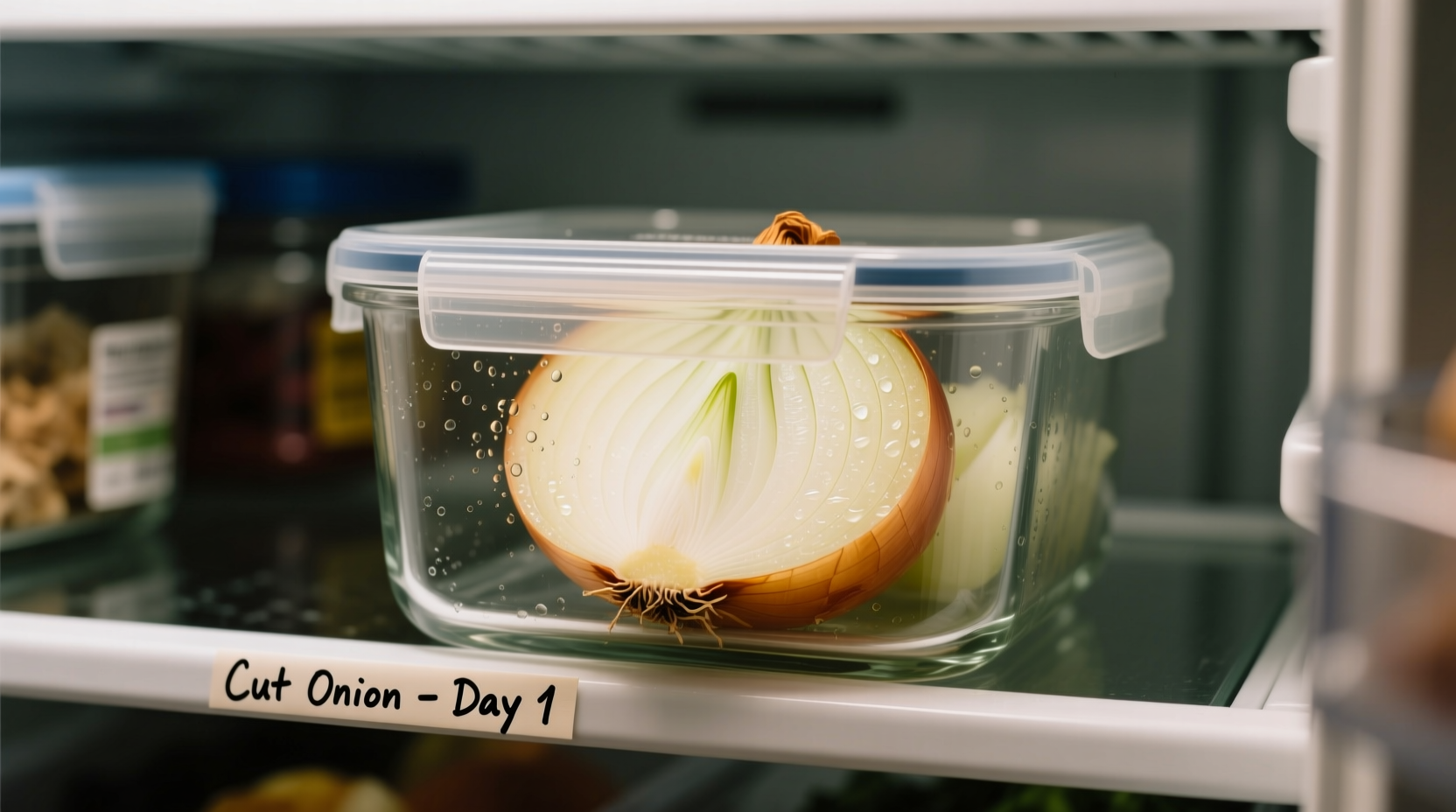Cut onions last 7-10 days in the refrigerator when stored properly in an airtight container at or below 40°F (4°C). This timeframe applies to white, yellow, and red onions that have been sliced, diced, or chopped.
The Science Behind Onion Shelf Life
When you cut into an onion, you rupture its cell walls, releasing enzymes and sulfur compounds that begin deteriorating immediately. This enzymatic browning and microbial growth are why cut onions don't last as long as whole ones. According to the USDA Food Safety and Inspection Service, proper refrigeration slows these processes significantly.
Factors That Determine How Long Your Cut Onion Lasts
Not all cut onions have the same shelf life. Several variables affect longevity:
| Factor | Optimal Condition | Effect on Shelf Life |
|---|---|---|
| Temperature | Consistently below 40°F (4°C) | Every 5°F increase above 40°F doubles spoilage rate |
| Container Type | Airtight glass or BPA-free plastic | Reduces oxidation and odor transfer by 70% |
| Cutting Method | Sharp knife on clean surface | Dull knives cause more cell damage, reducing shelf life by 2-3 days |
| Onion Variety | Yellow onions | Yellow: 7-10 days | Red: 5-7 days | White: 4-6 days |
Step-by-Step: Maximizing Cut Onion Freshness
Follow these professional kitchen techniques to extend your cut onions' shelf life:
- Prep properly: Wash hands and sanitize cutting board before starting. Use a sharp chef's knife to minimize cell damage.
- Immediate storage: Transfer cut onions to container within 10 minutes of cutting (critical food safety window).
- Container selection: Choose glass containers with tight-sealing lids or high-quality plastic containers specifically designed for food storage.
- Air removal: Press plastic wrap directly onto onion surface before sealing container to eliminate oxygen pockets.
- Strategic placement: Store in the main compartment of your refrigerator, not the door where temperature fluctuates.

When Cut Onions Go Bad: Warning Signs
Don't rely solely on the calendar—learn to identify spoilage through these visual and sensory cues:
- Texture changes: Slimy or mushy consistency indicates bacterial growth
- Color shifts: Yellow or brown spots spreading beyond initial cut areas
- Odor development: Sour or ammonia-like smell instead of characteristic sharpness
- Moisture accumulation: Excessive liquid in container not from initial cutting
According to the University of Minnesota Extension, if you notice any of these signs, discard the entire container—do not attempt to salvage portions that appear unaffected.
Practical Uses Before Your Cut Onions Expire
Make the most of your prepped onions with these time-sensitive applications:
- Days 1-3: Raw applications like salsas, salads, and garnishes
- Days 4-6: Cooked dishes where texture matters less (soups, stews, sauces)
- Days 7-10: High-heat applications like caramelized onions or roasted dishes
Alternative Storage Methods Compared
While refrigeration is optimal for cut onions, understanding other methods helps in different scenarios:
| Storage Method | Shelf Life | Best For | Limitations |
|---|---|---|---|
| Refrigerator (proper) | 7-10 days | Daily cooking needs | Requires proper containers |
| Room temperature | 2-4 hours | Immediate cooking | Food safety risk after 2 hours |
| Freezer (raw) | 6-8 months | Cooking applications only | Texture changes significantly |
| Vacuum sealed | 10-14 days | Professional kitchens | Requires special equipment |
The FDA Food Code specifically notes that cut produce like onions become potentially hazardous food items requiring temperature control for safety. Room temperature storage beyond two hours enters the "danger zone" where pathogens multiply rapidly.
Special Considerations for Different Onion Types
While the general 7-10 day rule applies to most common onions, specific varieties have different characteristics:
- Red onions: More delicate structure means they typically last 5-7 days. Their vibrant color fades noticeably as they age.
- White onions: Higher water content reduces shelf life to 4-6 days but provides superior crispness for fresh applications.
- Shallots: Last slightly longer at 8-12 days due to their smaller size and tighter cell structure.
- Green onions: Different storage requirements—roots in water, wrapped in damp paper towel.
Food Safety First: Why Timing Matters
Following proper storage timelines isn't just about quality—it's a critical food safety practice. The National Onion Association emphasizes that improperly stored cut onions can harbor pathogens like Salmonella and E. coli, which thrive in the nutrient-rich environment of cut produce.
When in doubt about storage duration, remember this professional kitchen rule: "If you're questioning it, questioning it means it's time to toss it." Better to waste a small amount of food than risk foodborne illness.
Extending Shelf Life: Pro Tips from Professional Kitchens
Commercial kitchens use these advanced techniques to maximize cut onion freshness:
- Add a teaspoon of lemon juice to the container to slow enzymatic browning
- Store with a piece of bread to absorb excess moisture (replace daily)
- Freeze in ice cube trays with water for precise portioning in cooking
- Use glass containers instead of plastic to prevent odor absorption
Frequently Asked Questions
Can you freeze cut onions for longer storage?
Yes, you can freeze cut onions for 6-8 months. Spread them in a single layer on a baking sheet, freeze until solid, then transfer to airtight freezer bags. Frozen onions work well for cooked dishes but lose crispness for raw applications.
Why do cut onions make me cry more the second day?
As cut onions age, their sulfur compounds break down further, creating more volatile compounds that irritate eyes. Fresher cut onions have more intact cell structures that contain these compounds better.
Can I store different cut vegetables together with onions?
It's not recommended. Onions emit ethylene gas and strong odors that can affect the flavor and shelf life of other vegetables. Store onions separately in their own container to maintain optimal freshness for all your prepped produce.
Do cooked onions last longer than raw cut onions?
Cooked onions typically last 3-5 days in the refrigerator—shorter than raw cut onions. The cooking process breaks down cell structures further and introduces moisture, creating conditions where bacteria can grow more rapidly.
Is it safe to eat cut onions left out overnight?
No, cut onions left at room temperature for more than 2 hours enter the food safety "danger zone" where bacteria multiply rapidly. The FDA recommends discarding any perishable food left out this long, regardless of appearance or smell.











 浙公网安备
33010002000092号
浙公网安备
33010002000092号 浙B2-20120091-4
浙B2-20120091-4